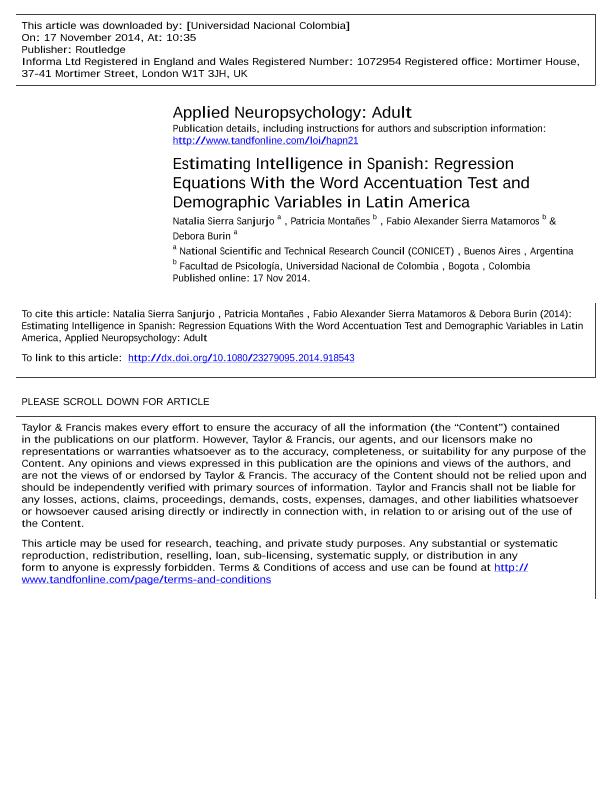Artículo
Estimating Intelligence in Spanish: Regression Equations with the Word Accentuation Test and Demographic Variables in Latin America
Sierra Sanjurjo, Natalia ; Montañes, Patricia; Sierra Matamoros, Fabio Alexander; Burin, Debora Ines
; Montañes, Patricia; Sierra Matamoros, Fabio Alexander; Burin, Debora Ines
 ; Montañes, Patricia; Sierra Matamoros, Fabio Alexander; Burin, Debora Ines
; Montañes, Patricia; Sierra Matamoros, Fabio Alexander; Burin, Debora Ines
Fecha de publicación:
07/2015
Editorial:
Taylor & Francis
Revista:
Applied Neuropsychology: Adult
ISSN:
2327-9109
Idioma:
Inglés
Tipo de recurso:
Artículo publicado
Clasificación temática:
Resumen
Spanish is the fourth most spoken language in the world, and the majority of Spanish speakers have a Latin American origin. Reading aloud infrequently accentuated words has been established as a National Adult Reading Test-like method to assess premorbid intelligence in Spanish. However, several versions have been proposed and validated with small and selected samples, in particular geographical conditions, and they seldom derive a formula for IQ estimation with the Wechsler Adult Intelligence Scale (WAIS) Full-Scale IQ (FSIQ). The objective of this study was to develop equations to estimate WAIS-Third Edition (WAIS-III) FSIQ from the Word Accentuation Test-Revised (WAT-R), demographic variables, and their combination within diverse Latin American samples. Two hundred and forty participants from Argentina and Colombia, selected according to age and years of education strata, were assessed with the WAT-R, the WAIS-III, and a structured questionnaire about demographic and medical information. A combined approach including place of birth, years of education, and WAT-R provided the best equation, explaining 76% of IQ variance. These equations could be useful for estimating premorbid IQ in patients with Latin American Spanish as their birth language.
Archivos asociados
Licencia
Identificadores
Colecciones
Articulos(SEDE CENTRAL)
Articulos de SEDE CENTRAL
Articulos de SEDE CENTRAL
Citación
Sierra Sanjurjo, Natalia; Montañes, Patricia; Sierra Matamoros, Fabio Alexander; Burin, Debora Ines; Estimating Intelligence in Spanish: Regression Equations with the Word Accentuation Test and Demographic Variables in Latin America; Taylor & Francis; Applied Neuropsychology: Adult; 22; 4; 7-2015; 252-261
Compartir
Altmétricas



